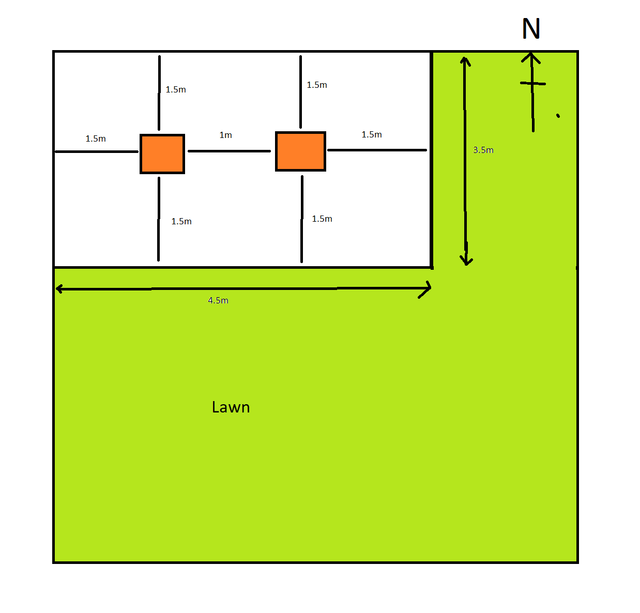HarryTuttle
New Bee
Hi,
I am still at the very early stages of deciding whether to start up my first hives next spring (possibly with two overwintered nucs in national hives).
I still have a lot to read up on and think about, but one of the first issues, which I am keen to get advice on, is the practicalities of the potential site.
I am fortunate enough to have a reasonable large, north facing garden, surrounded by other large garden plots and bordered with tall trees to the north, east and west.
So, there are plenty of natural barriers and any site would be well away from the neighbours.
I am considering fencing off the north west corner of the garden (picture below taken at about 3pm today), with 6 foot fencing and a gate, and placing two National hives in the centre (with 1 metre between hives and 1.5 metres all around to the fencing).
As the garden is long and north facing, it gets full sun in the morning and for most of the day, but I haven't yet figured out the shading on the planned 6 foot fencing, either in the summer or throughout the year.
The lawn runs the whole length of the garden and so will stop at the fenced area.
I am initially wondering
1) Do this seem a generally a good location for hives?
2) Does the spacing and fencing provide adequate separation of the bees and lawn users? (lawn is heavily used by kids aged 8+)
Obviously, I would encourage the kids to stay away from the fence, and make sure that nothing went over it, but I would want a setup where I was happy that they could be left without any need for constant supervision and I would not be worried about any incidents or anybody getting stung.
Any thoughts would be very much appreciated.


I am still at the very early stages of deciding whether to start up my first hives next spring (possibly with two overwintered nucs in national hives).
I still have a lot to read up on and think about, but one of the first issues, which I am keen to get advice on, is the practicalities of the potential site.
I am fortunate enough to have a reasonable large, north facing garden, surrounded by other large garden plots and bordered with tall trees to the north, east and west.
So, there are plenty of natural barriers and any site would be well away from the neighbours.
I am considering fencing off the north west corner of the garden (picture below taken at about 3pm today), with 6 foot fencing and a gate, and placing two National hives in the centre (with 1 metre between hives and 1.5 metres all around to the fencing).
As the garden is long and north facing, it gets full sun in the morning and for most of the day, but I haven't yet figured out the shading on the planned 6 foot fencing, either in the summer or throughout the year.
The lawn runs the whole length of the garden and so will stop at the fenced area.
I am initially wondering
1) Do this seem a generally a good location for hives?
2) Does the spacing and fencing provide adequate separation of the bees and lawn users? (lawn is heavily used by kids aged 8+)
Obviously, I would encourage the kids to stay away from the fence, and make sure that nothing went over it, but I would want a setup where I was happy that they could be left without any need for constant supervision and I would not be worried about any incidents or anybody getting stung.
Any thoughts would be very much appreciated.

















































